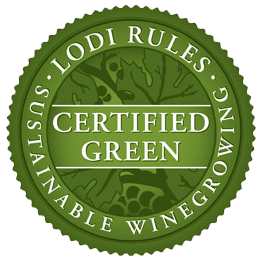 The Lodi Rules for Sustainable Winegrowing is California’s original sustainable viticulture certification program. The Lodi Rules certification process is rigorous, based in science, voluntary, and third-party audited. Lodi Rules certified growers make up an innovative community with a history and commitment to farming quality winegrapes through the implementation of viticulture practices that balance environmental, social, and economic goals. The Lodi Rules was designed to communicate our commitment to sustainable agriculture to wineries and the general public.
The Lodi Rules for Sustainable Winegrowing is California’s original sustainable viticulture certification program. The Lodi Rules certification process is rigorous, based in science, voluntary, and third-party audited. Lodi Rules certified growers make up an innovative community with a history and commitment to farming quality winegrapes through the implementation of viticulture practices that balance environmental, social, and economic goals. The Lodi Rules was designed to communicate our commitment to sustainable agriculture to wineries and the general public.
The Lodi Rules has two key components. First, the Lodi Rules promotes winegrape grower adoption of 101 sustainability practices, which we term “standards”. The standards were collaboratively developed by a team of Lodi winegrape growers and viticulture professionals, and were accredited by Protected Harvest in 2005. The Lodi Rules standards are the backbone of the program, and are organized into six chapters:
The standards meet three criteria: first, they are measurable; second, they address at least one of the three aspects of sustainability (environmental health, social equity, and economic viability); and third, they are economically feasible to implement. We believe that the Lodi Rules standards are the most thoroughly and rigorously vetted set of sustainability practices in California’s viticulture industry. All standards have been peer reviewed by third-party scientists, members of the academic community, and environmental organizations. Certified growers are required to implement a minimum of standards.
The second key component of the Lodi Rules is the Pesticide Environmental Assessment System (PEAS), which is unique to the Lodi Rules. PEAS is a model used to quantify the environmental and human impact of all pesticides applied in a vineyard. The PEAS model generates an Environmental Impact Unit (EIU) for each pesticide, which is based on the pesticide’s impact on 1) acute risk to farm workers, 2) dietary risks from acute and chronic exposure to people who consume the product, 3) acute risks to small aquatic invertebrates, 4) acute risk to birds, and 5) acute risk to bees and pests’ natural enemies. Pesticide use by Lodi Rules certified growers must fall below a specified level of PEAS impact units.
A vineyard qualifies for certification if it meets several criteria. First, growers accumulate points through implementing sustainability practices and must sum to at least 50% of the total points available in each chapter. Growers must accumulate at least 70% of the total points available across all six chapters. Implementation of some standards is mandatory. Such standards are those that the program designers believe are imperative for sustainability. Finally, the EIUs for the pesticides used in that vineyard for the given certification year cannot exceed a specified threshold. Certification is awarded to an individual vineyard on an annual basis. Certified vineyards must pass an annual independent audit to verify the implementation of sustainability practices.
To learn more about the Lodi Rules, please visit the Lodi Winegrape Commission website.